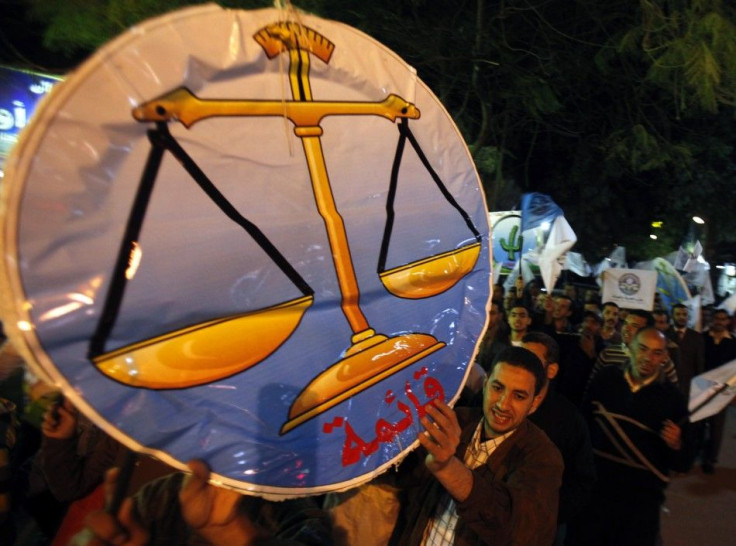Growing Pains In Egypt: Muslim Brotherhood Official Predicts End Of Israel

A high-ranking member of the Muslim Brotherhood made disparaging comments about the state of Israel on Tuesday, raising concerns about the group’s growing influence across the Middle East.
Essam el-Erian is the deputy head of the Freedom and Justice Party, or FJP, which is the Egyptian political wing of the pan-Arab Muslim Brotherhood. He told the newspaper Al-Sharq al-Awsat that “Zionism” would not end well.
“Jewish occupiers of the territory of historic Palestine are an obstacle to the Palestinians' right of return,” he said. “Anyone who can read the future can see that this project has a decade, less than a decade to go, and it is our faith that the people of Palestine can then return to Palestine.”
Erian’s ideas about a 10-year expiration date for the state of Israel have set off alarm bells across the region. But his comment was actually a botched attempt to dampen outrage over yet another provocative statement, which he made during a Dec. 27 live interview on Egyptian Dream TV, urging Israeli Jews of foreign origins, including Egyptian Jews, to return to their home countries.
“Egyptian Jews should refuse to live under a brutal, bloody and racist occupation [of Palestinian land],” he explained, adding that they would be welcome on Egyptian soil.
FJP officials defended Erian, pointing out that he did not explicitly denigrate Jewish people. Party spokesman Mohamed Soudan said that “Zionism” was the problem, not Judaism.
“Our policy is clear. We call on all occupied people to return to their lands and we ask, or rather hope, that Palestinian people will return,” he said, according to the Middle East news and blog site Al Bawaba.
He added that Jewish people “have a complicated history, but the Jewish motherland is not Israel.”
That didn’t do much to smooth things over. After all, these were not errant remarks from a fringe politician -- they were statements that reflect, at least partially, the evolving philosophies of the most powerful Islamist organization in the Middle East.
The Muslim Brotherhood was founded in Egypt during the late 1920s; it is rooted in the Sunni branch of Islam, though some members contest such religious divisions. The group began as a humanitarian and activist organization that conformed to the religious principles set out in the Quran, but it evolved to become more powerful -- and more political -- even as various secular forces fought to subdue the organization through legislation, suppression and even violence. Today, it has branches or affiliated organizations in every Middle Eastern country.
Erian has been a prominent member of the Muslim Brotherhood for decades. He was imprisoned several times while the party was banned under the administration of former Egyptian President Hosni Mubarak.
After that secular regime was overthrown in 2011, a round of national elections brought the Islamists of the Muslim Brotherhood to power for the first time in the history of Egypt. But the country has since struggled to fashion a functioning democracy. President Mohamed Morsi, for whom Erian serves as an advisor, showed early signs of pragmatism as a leader; he was an important mediator between Israeli forces and Palestinian militants during the two rivals’ latest deadly clash this past November.
But Morsi damaged his reputation badly when he seized vast powers for himself on a temporary basis in order to push through the final draft of a constitution that was approved by referendum in December. The constitution uses Islam as a framework, but it includes clauses to protect the rights of religious minorities, including Christians and Jews. The language is vague enough to leave uncertainties on all sides; it remains to be seen whether sectarian strife will endanger Egyptian progress, and whether minority rights will be dutifully defended.
In such a tense atmosphere, Erian’s comments certainly pricked some ears. Throw in the fact that Egypt has historically been a key partner to the West -- especially in soothing disputes between Israel and the Palestinians -- and it becomes clear that this is not just a domestic snafu but an issue of regional and global importance.
The Muslim Brotherhood has long defined itself by a simple slogan: Islam is the solution. That was an easy principle to abide by when governance wasn’t a concern -- but today, Egypt’s FJP faces the daunting task of reconciling religion with politics in a volatile region. Leading figures like Erian will have to adjust to their new roles, and that means avoiding blunders like predicting the dissolution of an official ally.
© Copyright IBTimes 2024. All rights reserved.






















